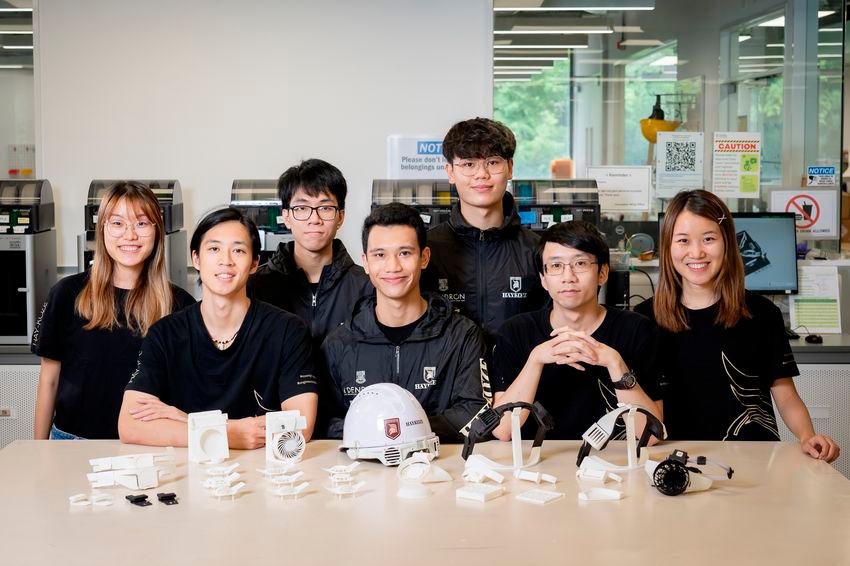-> 60% of Hong Kong’s 600,000 construction workers have suffered symptoms of heat stroke.[1]
-> With 2024 predicted to be one of the hottest years on record, the first half of the year has already been unusually warm, with five of the six months experiencing higher temperatures than normal.[2]
HONG KONG SAR - Media OutReach Newswire – 12 September 2024 - This year’s James Dyson Award Hong Kong winner directly addresses the severe issue of heat stress among construction workers with an innovative cooling accessory designed to enhance worker safety and productivity in these harsh conditions.
Air Ring 48 (AR48) is an advanced personal cooling device that integrates seamlessly with standard safety helmets, offering targeted relief to outdoor workers. Unlike existing solutions, AR48 strategically redirects airflow to areas with the highest sweat rates—such as the back of the neck, sides of the neck, and behind the ears. Based on the testing conducted by AR48 team, this targeted approach significantly reduces skin temperature by up to 3.20°C and core temperature by 0.67°C, demonstrating its ability to induce a cooling sensation to the whole body. Despite its powerful performance, AR48 boasts an impressive battery life, providing up to 16 hours of continuous cooling on a single charge.
As a wearable device, AR48 is designed for comfort and ease of use. Weighing just 150 grams, the AR48 is ultra-lightweight and comfortable, operating at a whisper-quiet 30dB. Its single-click helmet attachment ensures secure and easy use, minimizing distractions and discomfort for workers. Its robust construction is both waterproof and impact-resistant, fully compliant with industry safety standards, making it ideal for the demanding conditions of construction sites.
Beyond its technical prowess, AR48 stands out as an accessible solution to improve working condition for outdoor workers. The deliberate choice of parts not only optimize its cooling efficiency but also lowers the production cost which enables mass manufacturing, making this technology accessible across various industries. By improving working conditions and reducing the risk of heat-related illnesses, AR48 significantly enhances worker safety, offering a cost-effective solution to a widespread problem.
The Invention
The engineers behind AR48—Yu To Mak, Ze Fu Jeff Li, and Jing Hymn Joseph Wong—are students from the University of Hong Kong. Recommended by their professors, they entered the James Dyson Award, an international competition that recognises innovative designs focused on solving real-world problems, driven by their strong motivation to create a positive impact on society.
AR48 is the product of a rigorous two-year design process, culminating in the 48th prototype. The team utilised a blend of digital tools and hands-on methods like folding cardboard and sculpting clay to perfect the device’s proportions, airflow, and tactile details. Their goal was clear: to create a prototype that not only functions well in demanding outdoor conditions but also delivers an exceptional user experience.
Before entering the James Dyson Award, AR48 had already garnered significant recognition, winning numerous awards, including the HKSTP IDEATION Programme and Tam Wing Fan Innovation Fund. AR48 was also selected for exhibition at the Hong Kong Convention and Exhibition Centre as part of the HKU iDendron Incubation Programme.
As the Hong Kong winner of the James Dyson Award, AR48 has won £5,000, which the team plans to invest in further development, including manufacturing trials and waterproofing tests. Their ultimate goal is to introduce this transformative technology to the global market, improving working conditions for construction workers in Hong Kong and beyond.
“Winning the James Dyson Award is exciting, but it’s just the start. We want to make more things to help outdoor workers stay safe and comfortable. These workers build our city, and this is our way of saying thanks.” Jing Hymn Joseph Wong says, “With the Air Ring 48, we’re not just cooling off workers - we’re making work safer in a whole new way. We’re changing how we think about safety gear, one cool head at a time!”
Steve Yeung, Hong Kong judge, comments: “AR48’s practical application in tackling heat and noise issues, with potential uses beyond construction, makes it a versatile solution that significantly improves working conditions and safeguards workers’ health in challenging environments.”
AR48 will now advance to the next stage of the James Dyson Award, with the international Top 20 shortlist to be announced on 16th October, selected by Dyson engineers, and the global winners on 13th November, chosen by James Dyson.
The Runners Up
Problem: Epilepsy affects over 70 million people worldwide, leading to physical injuries significant psychosocial challenges.
Solution: NeuroHarbor offers a groundbreaking solution: a wireless, AI-powered seizure detection and treatment system. This innovative technology merges wearable EEG sensors with machine learning and therapeutic intervention, enabling real-time seizure management and greatly improving the quality of life for those living with epilepsy.
At its core is a sophisticated CNN-BiLSTM deep learning model, trained on over 1,000 hours EEG datasets with over 95% sensitivity and specificity to detect seizures with high accuracy. This algorithm powers a wearable 10g EEG patch featuring four unobtrusive electrodes, easily hidden within everyday headwear like hats or wigs. The system doesn’t just detect seizures in real-time; it’s also poised to be integrated with vagus nerve stimulation technology, potentially disrupting seizures before they even fully manifest.
James Dyson Award
The James Dyson Award is an international design competition which inspires and celebrates the next generation of design engineers. The Award operates across 29 countries this year and has supported over 400 problem-solving inventions with over £1m in prize money. It is run by the James Dyson Foundation, Sir James Dyson’s engineering-education charity.
[1] Greenpeace: https://www.greenpeace.org/hongkong/issues/climate/press/39875
[2] Hong Kong Observatory: https://www.hko.gov.hk/en/wxinfo/pastwx/mws2024/mws202406.htm









